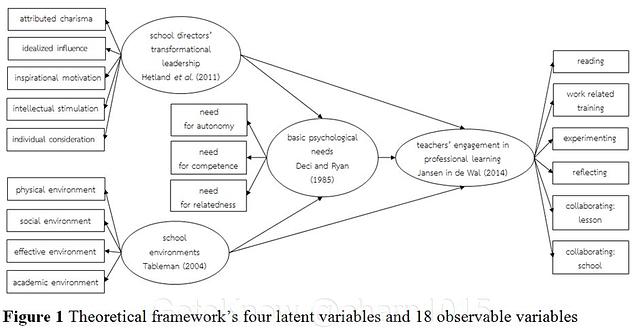A Causal Model of Transformational Leadership and School Environments through Basic Psychological Needs Affecting Teachers’ Engagement in Professional Learning in Schools under the Bangkok Metropolitan Administration
https://so05.tci-thaijo.org/index.php/PSAKUIJIR/article/view/218326
Abstract
The objectives of this quantitative research were: 1) to study transformational leadership and school environments through basic psychological needs affecting teachers’ engagement on professional learning in schools under the Bangkok Metropolitan Administration, and 2) to develop and validate consistency of a causal model of transformational leadership and school environments through basic psychological needs affecting teachers’ engagement in professional learning in these schools. A sample of 440 teachers was randomly drawn from all teachers in schools under Bangkok Metropolitan Administration in the 2017 academic year. The main method was a questionnaire, constructed by the researchers with overall reliability of .98. The data was analyzed using percentage, mean, standard deviation and structural equation modeling analysis. The main research results obtained for the four variables which are transformational leadership, school environments, basic psychological needs and teachers’ engagement in professional learning were: 1) All four variables were overall at a high level ( = 4.17, S.D. = .78). 2) Developing and validating consistency of the causal model of the four variables fitted very well with the empirical data ( 2 = 77.93, df = 60, 2/df = 1.30, P-value = 0.60, GFI = 0.98, AGFI = 0.94, RMR = 0.02, RMSEA =0.03).
Introduction
Schools manage education by plan and establish policy that can better reflect social aspirations. There should be projects to accelerate the increase of learning achievements to encourage students to effectively learn and to improve their skills. These can only be achieved with plans and policies for teacher development. Teachers' engagement in professional learning (TEPL) is an important factor because continuous professional learning is a fundamental way for teachers to adapt, to change, and to develop teaching skills.
Park, Lim. & Ju (2016) say that TEPL is important and meaningful theme for teacher development. Teachers’ professional learning is dependent on self-determined motivation of teaching (Deci & Ryan, 2000a). In the self-determination, Deci & Ryan (2006) distinguish between different reasons that evoke action. Intrinsically motivated action equals any action which is performed for pure enjoyment and satisfaction such as basic psychological needs (BPNs). In comparison, if an action is accomplished for such separable outcomes as transformational leadership (TLE) of the school directors of schools and school environments (SENs), the motivation is extrinsic.
For BPNs, Shuck, Zigarmi & Owen (2014) find that psychological needs, engagement, and work intentions are within the engagement-performance linkage. They explain the latent processes of engagement that underpin the observed relationships of engagement in practice. In addition, Deci & Ryan (2000b) say that TEPL intrinsically motivated behavior satisfies three basic, innate psychological needs. These are autonomy, competence, and relatedness.
Leadership has a key role in TLE into motivational and supportive behaviors. This is continuous learning organization (Darling-Hammond, Wei, Andree, Richardson, & Orphanos, 1999). TLE has been cited for developing and promoting employees (Bass & Avolio, 1995). Therefore, the key factor that leads teachers to participate in activities and commit to teacher professional learning in schools is TLE.
SENs are important indicators of organizational strength. The environment should be friendly and conducive to learning and promoting communication and interaction. Encouragement of feelings is part of self-esteem. Promoting academic learning is a reflection of the school's atmosphere to change and to get the necessary conditions for teaching (Tableman, 2004). The SENs are a supporting factor for BPNs in motivating TEPL (Jansen in de Wal, 2014).
In Thailand, the Ministry of Education used to be and still is a central educational administrative body and has educational management to fulfill the various learning needs, but there are problems regarding the coherence between fiscal and effectiveness of the educational management because of the possible damage which can occur by the centralization of power (Jermsittiparsert, Sriyakul, Pamornmast, Rodboonsong, Boonprong, Sangperm, Pakvichai, Vipaporn and Maneechote, 2016a). With the 1999 National Education Act, some schools have been decentralized to be under local administration bodies. Jermsittiparsert et al. (2016b) find that, in the long run, schools under local administration bodies, trend to be better responded to social needs than those under the Ministry of Education. Schools under the BMA manage education similar to those under local administration bodies. Therefore, these schools are well accepted. However, there still are rooms of improvement through teacher development.
For these reasons, the researcher is interested in studying a causal model of TLE and SENs through BPNs affecting TEPL in schools under the BMA. The results of this research can be used as the knowledge of human resource management. This is a way to elevate teachers' commitment to self-development in higher teacher education. It also encourages teachers to be professional teachers. As a result, the teachers can manage the quality of continuous and sustainable teaching.

ความเห็น (0)
ไม่มีความเห็น